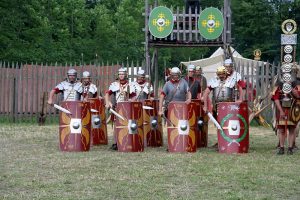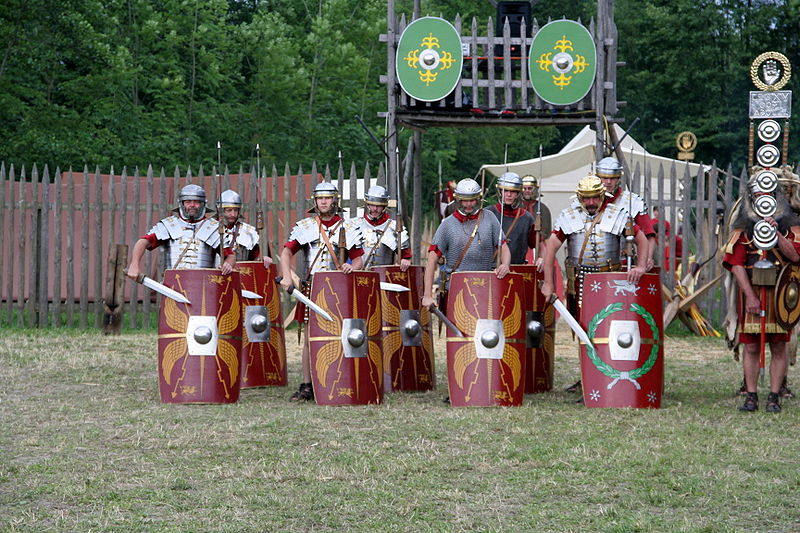 I love the ancient world. More specifically, I love studying western Eurasia anytime before AD 500. This was my original, grade school love affair with the past, and while my interests later diversified and I sought degrees in modern history, the ancient past has never lost my attention (leading me to remark to one professor at Gettysburg that I “dabble in archaeology,” much to his amusement). One result of this, as you might expect and surmise from many of my reviews here on Concerning History, is a deep and abiding affection for ‘swords-and-sandals’ movies. I listen to a fair number of movie and entertainment news podcasts, and I couldn’t help but notice an absence of these kinds of movies in recent years. This post was originally intended to be my musings on the cause of that absence, but I quickly realized that I was wrong; there wasn’t an absence of swords-and-sandals movies per se; there just weren’t any I liked.
I love the ancient world. More specifically, I love studying western Eurasia anytime before AD 500. This was my original, grade school love affair with the past, and while my interests later diversified and I sought degrees in modern history, the ancient past has never lost my attention (leading me to remark to one professor at Gettysburg that I “dabble in archaeology,” much to his amusement). One result of this, as you might expect and surmise from many of my reviews here on Concerning History, is a deep and abiding affection for ‘swords-and-sandals’ movies. I listen to a fair number of movie and entertainment news podcasts, and I couldn’t help but notice an absence of these kinds of movies in recent years. This post was originally intended to be my musings on the cause of that absence, but I quickly realized that I was wrong; there wasn’t an absence of swords-and-sandals movies per se; there just weren’t any I liked.
Swords-and-sandals movies first had their heyday in the fifties and sixties, with the most famous among them likely being Spartacus and Ben Hur. I must confess, I have never watched any movies of this wave, nor, frankly, do I ever intend to. I’m generally not a fan of old movies, and watching them inevitably butcher one of my beloved time periods is not something I want to sit through. A second noticeable wave of swords-and-sandals movies came in the first decade of the 2000s, with such highlights as Troy, 300, and of course, the Academy Award-winning Gladiator. These are by and large what I grew up on, but even these are not uniformly my cup of tea. The more fantastical or mythical these movies were, the less I felt inclined to give them a try, and the more realistic and historical they were, they more I watched them over and over. Seeing a pattern here? So am I.
Turns out, I don’t think I like swords-and-sandals movies all that much, with their implication of cheesy, B-movie action, one liners, and over-acting. What I like are serious (maybe too serious) historical dramas or action media set in the ancient world. My two absolute favorites, Gladiator and King Arthur (the latter of which I’ve reviewed on CH), are even more revealing, and when considered further, show an inherent conundrum in my affections that go a long way to explaining that earlier perceived absence.
Nearly universally acclaimed, winner of multiple Oscars including Best Picture, Gladiator is the pinnacle of ancient historical action drama. Except, it’s not, for me. Don’t get me wrong; I love it to pieces. It’s music gets regularly stuck in my head of its own accord, and I’ve been known to whisper “There was a dream, once, that was Rome” to myself as I’m driving alone. All very nerdy. But Gladiator has one glaring problem (discussed before on CH in one of our earliest posts): it has an amazing story…that is completely unhistorical. The Roman Republic was not restored in the late 2nd century AD, and the egalitarian sentiments expressed by its characters are nearly two millennia too early. This may be a necessity, however; modern audiences need to connect with their characters, and the mindset of ancient polytheistic warriors and autocrats are not exactly easy to identify with.
King Arthur, on the other hand, is the opposite. I’ve met exactly two other people who love this movie nearly as much as I do (shout out to Sarah and Val, if you’re reading this). It’s almost universally panned among both movie fans and historians, but I love it for two reasons. First, its narrative valiantly attempts to combine a number of historical sources and events into one, almost accurate, story. This is probably the source of much of the movie’s hate; historical accuracy does not a compelling story make. Just ask Alexander, a four-hour odyssey that almost exactly recreates the original ancient source material and falls spectacularly flat as a result. Second and more importantly, it nails the feel of the fifth century Western Roman Empire. The music and dialogue are full of doom; the sun shines only once in the movie, at the very end when Arthur, his Sarmatian auxiliaries, and their Brythonic allies have established their Romano-British successor kingdom.
So, in short, I want serious, high-production-value movies set in the ancient world with fantastic stories that are still historically accurate, not presentist, and evoke the probably-ahistoric ambience I myself feel for that respective period. Shouldn’t be too hard, right? All of us who move in the historical realm struggle with this intersection of professional responsibility and personal enjoyment but, in my experience, knowing what our blindspots and irrational preferences are helps keep us honest, a smidge more objective, and even increases opportunities for enjoyment. So how about it? Anyone else have a complicated relationship with historical movies? What are some of your own oxymorons? Your own unreasonable complex, unreasonable expectations? Share them below, and maybe one of these days, we’ll all finally find that perfect new movie that meets every one of our unmeetable criteria.
